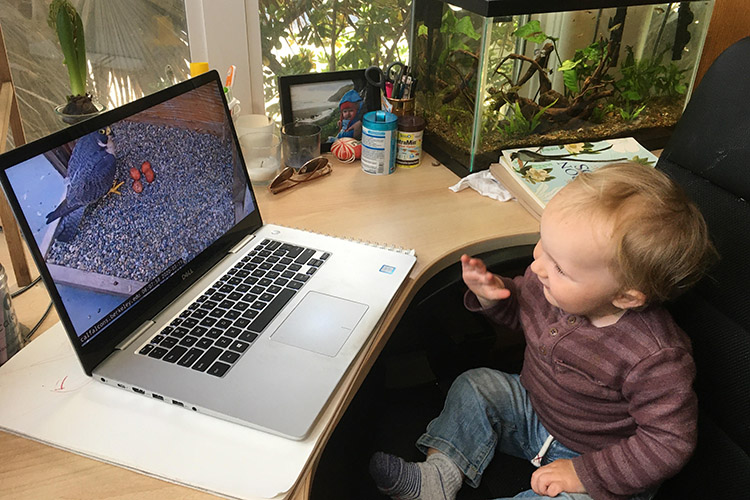UC Berkeley’s falcon family tending to four-egg clutch
Annie and Grinnell's clutch heads for Hatch Day
March 19, 2020

Mother falcon Annie with her four eggs, the last one laid on March 18. They’ll hatch sometime around April 18. (Photo courtesy of Cal Falcons)
With the arrival sometime yesterday of their fourth and last egg of the season, UC Berkeley peregrine falcons Annie and Grinnell are sheltering in place like the rest of us — except for essential hunting duties — to take turns sitting on their clutch in the family’s Campanile home. Local scientists and wildlife experts studying, caring for and educating the public about the falcon family expect the rusty-brown speckled eggs to hatch right around Saturday, April 18.
“Annie was super-secretive about this last egg. The first picture of it was at 4:30 a.m. today,” said Sean Peterson, a Berkeley Ph.D. student in the Department of Environmental Science, Policy and Management, who, along with Lynn Schofield, runs the Cal Falcons social media project.
“I ran the (24/7 livestreamed) video back through the night, (and), while we aren’t certain, it looks like it was 12:06 a.m.,” said Mary Malec, a local volunteer raptor nest monitor who is part of the campus falcons’ team. “We’ll use that time for our official ‘timing between eggs’ records.”
The hatch window, he added, averages 24 to 48 hours from first egg to last egg, so hatching may take up to two days.
Discussions are underway as to whether a Hatch Day event like last year’s, on the big outdoor screen at the Berkeley Art Museum and Pacific Film Archive, will happen. “It’s hard to say, with the COVID-19 rules in effect,” said Peterson. “We may try to schedule a day on the big screen when the chicks are older and more active, which would be fun for people to watch.”

Vireo Schofield-Peterson waves to Annie the falcon while watching the 24/7 Campanile webcam that’s focused on the nest. (Photo courtesy of the Schofield-Peterson family)
Peterson and Schofield, who are married, are watching the falcons — with son Vireo, age 17 months, since his daycare closed because of COVID-19 precautions — on a computer in their apartment. Three webcams in the bell tower continually display the birds’ activity.
As the falcons grow their family, the Campanile Peregrine Fund continues to increase through the online sale of T-shirts, and already $3,000 has been raised. The limited offer is scheduled to end April 24.
Also rising is the number of responses to Cal Falcons’ Instagram, Facebook and Twitter posts, many of them written by people who follow the falcons, or follow them more than ever before, as a welcome distraction — and even a ray of hope — during the coronavirus pandemic.
“In the midst of all that surrounds us we have the hatching of these eggs to look forward to. The beginning of new life. GO BEARS!” wrote one fan. “You have no idea how great it is to watch Annie and Grinnell. They give me hope in difficult times. Thank you Cal Falcons!” said another.
With schools closed, parents at home all day with their kids are thankful, too. “Thank you so much for your updates and feed,” a mother commented. “You are part of my kids’ daily science lessons for our hopefully short and temporary home schooling.” Wrote another parent, “Since we are home schooling a five-year-old now, the TV goes off at 9:00 a.m. But instead of “off,” we just switch to the nest cam.”